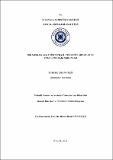DSpace Repository
2001 SONRASI AFGANİSTAN’DA İL YÖNETİMİ, MEVZUAT VE UYGULAMADAKİ SORUNLAR
JavaScript is disabled for your browser. Some features of this site may not work without it.
| dc.contributor.author | Rahmani, Obaidullah
|
|
| dc.date.accessioned | 2020-01-16T12:59:32Z | |
| dc.date.available | 2020-01-16T12:59:32Z | |
| dc.date.issued | 2019-09 | |
| dc.identifier.uri | http://hdl.handle.net/11547/5322 | |
| dc.description.abstract | Bu çalışmada 2001 sonrası Afganistan’da il yönetimi, mevzuat ve uygulamadaki sorunlar incelenmiş olup Afganistan’ın yerel yönetim teşkilatı içerisinde il yönetimi merkezi yönetimin sıkı kontrolü kapsamında yerel düzeyde merkezi yönetimin politikalarını yürütmekte olup yerel düzeyde en üst yerel yönetim birimini oluşturmaktadır. Afganistan’da 2001 yılından itibaren il yönetiminin anayasal statüsü ve kuruluş şartları yeniden değerlendirilip belirlenmiş olup il kurulması ardından il yönetim karar organı olan vali merkezi yönetim tarafından atanmaktadır böylelikle vali hem merkezi yönetimi hem de yerel yönetimi yerel düzeyde temsilcisi niteliği taşımaktadır. Il yönetiminin genel teşkilatları, il idari meclisi, il emniyet müdürlüğü, il kalkınma komitesi, il meclisi, il mahkemesi ve bakanlıkların il idari birimlerinden oluşmaktadır. Il yönetim teşkilatı konusunda 2004 Anayasanın 136. Maddesinde “illerin kurumsal yapısı ve yönetim kurumların, ilde yaşayan vatandaşların kültürel, sosyal ve coğrafi şartlarına göre kanunla belirlenmektedir” hükmü bulunmaktadır. Bunun yanı sıra il kapsamında demokratik kurum olarak il meclisi de bulunmaktadır. Genel olarak yerel düzeyde merkezi yönetimin güçlü bir şekilde idari, mali ve politika uygulama yetkisi bulunmaktadır. Ülkede yerel yönetimlerle ilgili net bir mekanizma olmadığından dolayı bu durum il yönetiminde yönetimsel sorunları meydana getirmiştir. Sorunların en önemlisi il yönetiminde merkezi yönetimin il yönetim kapsamında üst düzey personel atanmasında, bütçe belirlemesinde ve harcama oranının belirlemesinde ve politika çıkarmasında tam yetkili olması nedeniyle il yönetim mevzuatında hukuki sorunu, istihdam sorunu, yönetim sorunu ve kaynak yetersizliği sorunu ortaya çıkmaktadır. | tr_TR |
| dc.language.iso | tr | tr_TR |
| dc.publisher | İSTANBUL AYDIN ÜNİVERSİTESİ SOSYAL BİLİMLER ENSTİTÜSÜ | tr_TR |
| dc.subject | Afganistan | tr_TR |
| dc.subject | Yerel yönetimler | tr_TR |
| dc.subject | İl yönetimi | tr_TR |
| dc.subject | Yerel yönetim sorunları | tr_TR |
| dc.subject | Afghanistan | tr_TR |
| dc.subject | Local goverments | tr_TR |
| dc.subject | Provincial adminiztration | tr_TR |
| dc.subject | Local goverment issues | tr_TR |
| dc.title | 2001 SONRASI AFGANİSTAN’DA İL YÖNETİMİ, MEVZUAT VE UYGULAMADAKİ SORUNLAR | tr_TR |
| dc.type | Thesis | tr_TR |
| dc.description.abstractol | In this study, the problems of provincial administration, legislation and implementation in Afghanistan after 2001 were examined and the policies of the central government at the local level within the scope of the strict control of the provincial government within the local government organization of Afghanistan and constitutes the top local government unit at the local level. Since 2001 in Afghanistan, the constitutional status and conditions of the establishment of the provincial administration have been re-evaluated and determined, and after the establishment of the province, the governor, who is the provincial administrative decision-making body, is appointed by the central government, so that the governor is both the center both the local government is representative at the local level. The general organizations of the provincial administration are the provincial administrative council, provincial police department, provincial development committee, provincial council, provincial court and provincial administrative units of the ministries on the provincial administrative organization on the subject of the 2004 Constitution 136. Article "the institutional structure of the provinces and the administrative institutions are determined by law according to the cultural, social and geographical conditions of the citizens living in the province". In general, the central government at the local level has a strong administrative, financial and policy implementation authority, which has created administrative problems in provincial administration because there is no clear spatialism of local governments in the country. The most important problem is the legal problem in provincial administration legislation because the central government in provincial administration is fully authorized to appoint senior staff within the scope of provincial administration, to determine budget stake and to determine the expenditure rate and to issue policy, the problem of employment, management problem and lack of resources arises. | tr_TR |
| dc.publisher.firstpagenumber | 1 | tr_TR |
| dc.publisher.lastpagenumber | 77 | tr_TR |
| dc.identifier.bibliographictag | Obaidullah, Rahmani, 2001 SONRASI AFGANİSTAN’DA İL YÖNETİMİ, MEVZUAT VE UYGULAMADAKİ SORUNLAR(2019), İSTANBUL AYDIN ÜNİVERSİTESİ SOSYAL BİLİMLER ENSTİTÜSÜ | tr_TR |
Files in this item
This item appears in the following Collection(s)
-
Tezler -- Thesis [3451]
